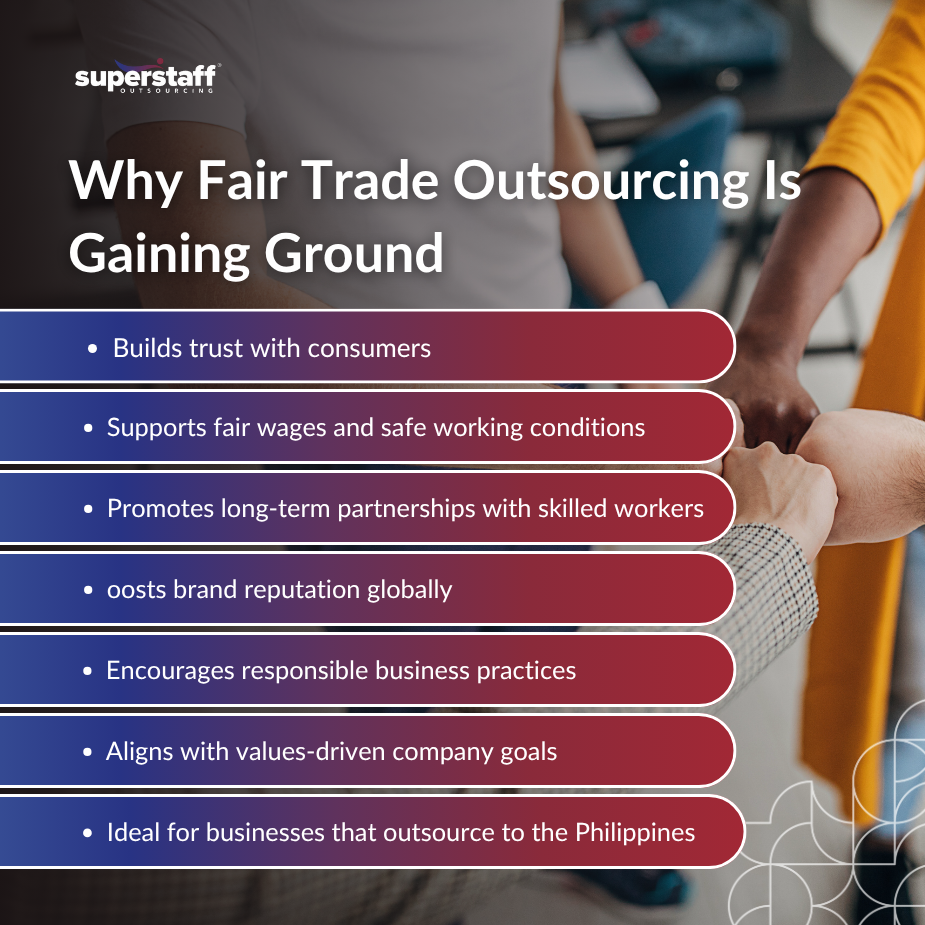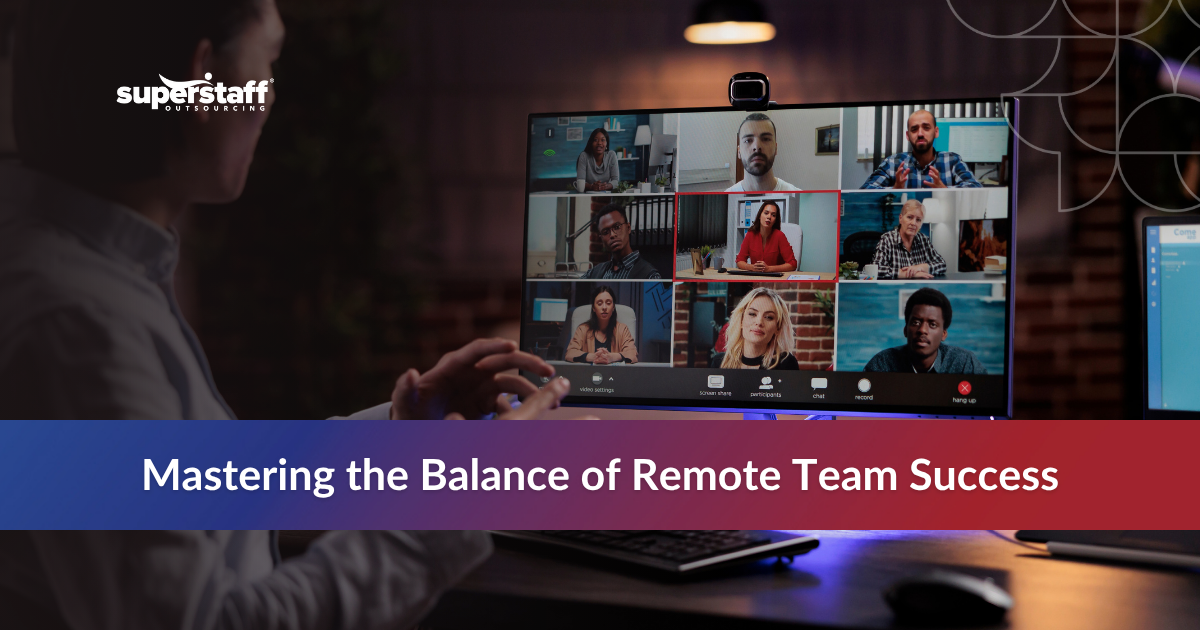
Companies across industries are changing how they manage their outsourcing. Instead of focusing only on cost and speed, more are now looking at fairness, ethics, and long-term partnerships. Fair trade outsourcing has become a reliable way to meet business goals while supporting better labor practices.
This shift is not limited to large brands. Even small and mid-sized companies now want to make sure their outsourced teams are treated well, paid fairly, and given the right tools and support. Fair trade outsourcing combines productivity with people-first values. It helps businesses meet customer expectations, avoid reputational risks, and stay ahead of labor laws.
Let’s explore why more companies are making the switch and what fair trade outsourcing can offer.

What Is Fair Trade Outsourcing?
Fair trade outsourcing puts people at the center of outsourcing partnerships. It focuses on fairness, safety, and responsibility in how workers are treated and supported.
1. Fair Wages and Good Working Conditions
Fair trade outsourcing ensures that all workers are paid a living wage. This means they earn enough to meet basic needs without working extra hours.
2. Safe and Respectful Work Environments
Companies that follow fair trade principles must provide safe, clean, and supportive workplaces. Workers are given the tools, training, and protection they need to do their jobs well.
3. Equal Opportunity Hiring
This model supports fair hiring, where jobs are open to people regardless of gender, background, or physical ability. Everyone has a chance to grow and succeed.
4. Transparency and Monitoring
Fair trade outsourcing includes regular audits and open reporting systems. Businesses can clearly see how their partners treat workers.
5. Focus on Worker Development
Workers are not only trained for the job. They also receive support for long-term growth, such as language skills, digital literacy, and financial planning.
Reasons Companies Are Adopting Fair Trade Outsourcing
More businesses are shifting from traditional outsourcing to ethical practices. These are the main reasons companies are adopting fair labor and ethical outsourcing strategies.
1. Aligning With Customer Values
Customers now ask more questions about where and how products and services are made. Fair trade outsourcing helps companies show they care about fairness, not just profit.
2. Meeting ESG and CSR Goals
Fair trade models help companies reach Environmental, Social, and Governance (ESG) targets. It also supports corporate social responsibility (CSR) programs that go beyond donation-based models.
3. Lowering Risk of Public Backlash
Labor violations can harm a company’s brand. By choosing ethical outsourcing, businesses reduce the risk of negative press or legal trouble.
4. Supporting Local Economies
When companies outsource fairly, they support community growth in regions where jobs are needed. This creates a more stable and committed workforce.
5. Building Long-Term Partnerships
Fair trade outsourcing is not based on quick savings. It’s about building trust, reducing turnover, and improving service quality through long-term relationships.
Where Fair Trade Outsourcing Is Making an Impact
The fair trade approach is gaining ground in many industries. Here’s where it’s being applied most.
1. E-commerce and Retail
Companies want fair supply chains, from customer service to product sourcing. Fair trade outsourcing supports ethical operations in both digital and physical retail.
2. Customer Service and Tech Support
Support roles often face high turnover and stress. With better working conditions, support agents stay longer and provide better service.
3. Healthcare and Wellness
Ethical outsourcing in healthcare helps ensure patient support services are delivered with care, respect, and full compliance with labor standards.
4. Digital Services and Content Moderation
Fair trade outsourcing brings structure and balance to digital roles. Workers get support for mental health, career growth, and safe work practices.
5. Manufacturing and Back Office Services
Even data entry and admin support roles benefit from fair treatment. Fair trade models ensure these workers are not left out of development opportunities.
How to Shift to a Fair Trade Outsourcing Model
Companies can adopt fair trade outsourcing with clear steps. It requires planning, but the long-term benefits make it worth the effort.
1. Review Current Outsourcing Practices
Start by evaluating your current outsourcing partners. Are they transparent about wages, working hours, and hiring practices?
2. Set Clear Labor Standards
Develop internal guidelines that reflect fair labor values. Share these standards with all outsourcing providers and hold them accountable.
3. Work With Certified Providers
Look for partners who follow fair trade principles. Choose those with clear hiring policies, open reporting, and good community practices.
4. Use Transparent Reporting Tools
Set up tools to track hours, pay, training, and feedback. Regular reports keep all sides informed and help build trust.
5. Educate Teams on Ethical Outsourcing
Everyone involved, from procurement to leadership, should understand the benefits of fair trade outsourcing and how to support it.
Why More Companies Outsource to the Philippines
Many businesses choose to outsource to the Philippines when applying fair trade models. The country has a strong BPO sector and a growing culture of ethical business.
1. Skilled, English-Speaking Workforce
Workers in the Philippines are known for their communication skills and global work experience. They’re ready to serve customers from around the world.
2. Cultural Alignment
Filipino workers bring empathy, professionalism, and a strong work ethic. These traits support the values behind fair trade outsourcing.
3. Strong Labor Regulations
The Philippines has labor laws that protect workers’ rights. Partnering with compliant providers ensures teams are treated fairly.
4. Community-Focused BPO Providers
Many outsourcing providers in the Philippines give back to the communities they hire from. This includes education, housing, and local training programs.
5. Competitive and Ethical Pricing
Fair trade outsourcing from the Philippines allows companies to save on costs without cutting corners on worker welfare.
Fair Trade Outsourcing Supports Business and People
The shift toward fair trade outsourcing is not just about ethics. It also brings real business advantages, especially for long-term growth and customer loyalty.
1. Reduced Turnover
Workers in fair environments are more likely to stay, train, and grow with the company. This means less time spent hiring and onboarding.
2. Higher Productivity
When workers feel respected, they work more efficiently. Fair wages and safe conditions lead to fewer errors and better focus.
3. Positive Brand Reputation
Customers want to support brands that treat workers well. Fair trade outsourcing helps businesses send the right message.
4. Lower Risk of Disruption
Ethical partners are more stable. They follow rules, respect contracts, and avoid issues that could slow down operations.
5. Better Quality of Service
Happy workers deliver better service. Whether in tech support, retail, or data services, fair outsourcing raises the overall standard.
Ethical Outsourcing That Builds Real Value
Fair trade outsourcing is not a trend. It is a practical and responsible way to run operations. Businesses that choose this model enjoy stronger partnerships, better service, and improved public trust. They also help build a global workforce where everyone benefits, not just shareholders.
SuperStaff supports this shift by offering ethical outsourcing solutions built on fair pay, safe working conditions, and long-term staff development. Whether you need customer support, research assistance, or back office services, we provide skilled professionals who work with care and commitment.
Choose a partner that respects both people and performance. Outsource to the Philippines with SuperStaff and grow your business the right way.






